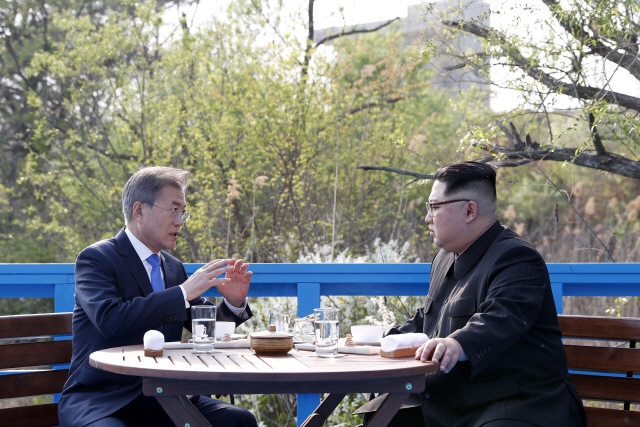Tuesday is the third anniversary of the historic inter-Korean summit between South Korean President Moon Jae-in and North Korean leader Kim Jong-un, where the two leaders vowed for peace and reunification on the Korean Peninsula. Despite the flurry of efforts toward reconciliation since, hopes for peace on the long-divided peninsula remain tempered by a deadlock in nuclear diplomacy and Pyongyang’s recent escalation of tension.
Unlike in the past two years, the Korean government is not holding an official event on Tuesday to mark the anniversary of April 27, 2018, when Moon and Kim held their first summit on the South’s side of truce border village Panmunjom.
Several events to mark the anniversary organized by the nongovernment groups will, however, take place.
The Unification Ministry, in charge of inter-Korean affairs, cited the COVID-19 quarantine situation as a reason for the absence of an official ceremony, but many believe the strained ties between the two Koreas pose as a major factor.
The April summit was the first such meeting between the leaders of the two Koreas in 11 years. The high-profile summit culminated with Moon and Kim signing the Panmunjom Declaration, pledging to commit to the “complete denuclearization” of the Korean Peninsula, improve inter-Korean relations and officially end the 1950-53 Korean War.
Following the summit, the leaders met two more times that year, in May on the North’s side of the border village and then their third summit in Pyongyang in September. Alongside the inter-Korean engagement, Kim met with US President Donald Trump in Singapore in June, which marked the first-ever meeting between the leaders of the two countries.
Trump and Kim met again in Hanoi in February 2019, raising hopes for peace and denuclearization on the peninsula. But the Hanoi Summit fell through, with the two sides failing to narrow differences on the steps each side needed to take toward denuclearization and sanctions relief.
Since then the US-North Korea nuclear talks have remained at a deadlock, as have inter-Korean relations. Moon has proposed talks and various cross-border projects since, but has been largely ignored by Pyongyang.
Instead, Pyongyang began building tensions again, demolishing the inter-Korean liaison office last June, and killing a South Korean fisheries official drifting near its western sea border in September.
North Korea has also turned away from pinning hopes on diplomacy with Washington and Seoul, but instead has been focusing on beefing up the nation’s drive for “self-reliance” and bolstering its weapons program, as the reclusive regime faces serious economic challenges in the wake of prolonged US-led sanctions and the coronavirus pandemic.
Washington also reached out to Pyongyang multiple times in February to break an impasse, but Pyongyang ignored the calls.
The North recently fired two ballistic missiles in an apparent warning to Washington, as the Joe Biden administration is nearing completion of its policy review on Pyongyang.
As Moon’s presidential term has only about a year left to go, Seoul is scrambling for ways to resume dialogue with North Korea and make progress. Pyongyang’s latest decision to skip the upcoming Tokyo Olympics due to coronavirus concerns, however, thwarted Seoul’s hopes to use the games as an opportunity for rapprochement with the reclusive regime, like it did with the PyeongChang Olympics in 2018.
The Unification Ministry on Monday called for the resumption of talks between the two Koreas at “all levels” as soon as possible.
While many analysts paint a dim picture of prospects for engagement with Pyongyang, others also express hope that the upcoming summit between Biden and Moon in mid-May could serve as an opportunity to stir momentum.
“Biden and Moon are expected to meet and how to deal with North Korea is expected to top their agenda,” said Yang Moon-jin, a professor at the University of North Korean Studies. “The talks could serve as an occasion for the two countries to work together to resolve the North Korean issue, and create momentum to revive nuclear talks.”
He added there is still time for Moon to make progress in pursuing his legacy-defining peace process on the peninsula. But considering the COVID-19 situation, Yang acknowledged difficulties in replicating similar big overtures in 2018. But Seoul could first start with restoring suspended communication channels with Pyongyang, and start with communication via videoconference or exchange of documents, he added.
The ministry on Monday held a test-run of a new, recently completed video conference facility specifically designed to hold talks with North Korea virtually. The room, built with a budget of 400 million won ($360,000), is part of Seoul’s effort to prepare for future talks with Pyongyang amid the COVID-19 situation.
By Ahn Sung-mi (
sahn@heraldcorp.com)








![[Today’s K-pop] Blackpink’s Jennie, Lisa invited to Coachella as solo acts](http://res.heraldm.com/phpwas/restmb_idxmake.php?idx=644&simg=/content/image/2024/11/21/20241121050099_0.jpg)